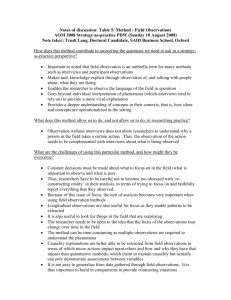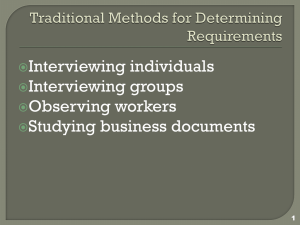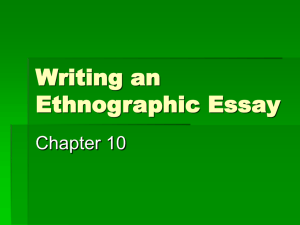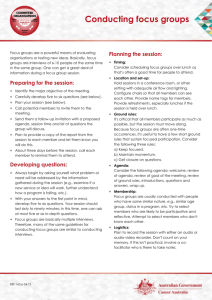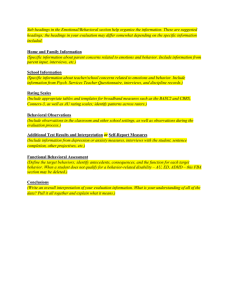First-in-family learners... - Dr S. O'Shea
advertisement
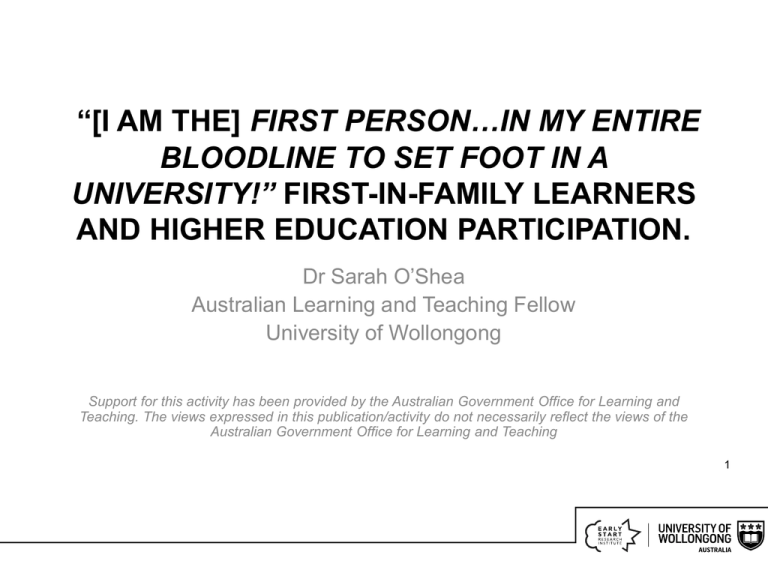
“[I AM THE] FIRST PERSON…IN MY ENTIRE BLOODLINE TO SET FOOT IN A UNIVERSITY!” FIRST-IN-FAMILY LEARNERS AND HIGHER EDUCATION PARTICIPATION. Dr Sarah O’Shea Australian Learning and Teaching Fellow University of Wollongong Support for this activity has been provided by the Australian Government Office for Learning and Teaching. The views expressed in this publication/activity do not necessarily reflect the views of the Australian Government Office for Learning and Teaching 1 Today’s Session • Setting the scene • Expectations of higher education for first-in-family students • Family and higher education participation • Strategies used to navigate the university environment • Questions and Close 2 Who are first in family students? 1. The ‘slippery nature’ of definitions 1. This student cohort reported as not achieving to the same level academically compared to peers 1. Within Australia, 26% of first in family students are reported as considering leaving university in the first year of university study, a figure that increases to 34% for later year students (Coates & Ransom, 2011). 3 Who are first in family students? 4. Deficit thinking - a ‘group at risk’ (Spiegler & Bednarek, 2013, p329) 5. Approximately 51% of university students in Australia can be defined as first-in-family backgrounds (based on parental educational levels) which is close to the OECD mean average of 53% (OECD, 2012) 4 Summary Literature review • We live in the era of the neo-liberal learner where everyone is ‘unencumbered by domestic responsibilities, poverty or self doubt’ (Leathwood, 2006, p615). • Literature tends to portray this student cohort in deficit terms using words such as ‘challenges’, ‘difficulties’ and ‘help’ (Thayer, 2000; Brachman, 2012; Gardner, 1996). • The ‘lack’ of access to an ‘educational memory’ within the family, the role played by ‘transgenerational family scripts or “inheritance codes”’ in educational choices. (Ball, Davies, David & Reay, 2002, p57) 5 Summary Literature review • The OECD (2013) reports that amongst member countries, students from a more educated family are ‘almost twice (1.9)’ as likely to attend university (p.3) than peers. • Similarly, within the UK, Croll (2004) points out there are ‘considerable patterns of continuity between the socio-economic situation of parents and their adult children’ (p. 391). 6 Research Focus • An Australian Office of Learning and Teaching Grant that built upon an institutional educational grant in 2012-2013 (Stage 1) • For the purposes of this research, first in family status was defined as: no-one in the immediate family of origin including siblings, children, partners or parents having previously attended a higher education institution or having completed a university degree. • Inclusion of family members – looking at this return from the perspective of the student and their family members 7 Stage One : Research Study (UOW)* • In-depth interviews with 25 undergraduate students • Focus on the cultural wealth of participants rather than deficits • While small scale the data was very rich and generated a number of outputs (O’ Shea, 2014; 2015a, 2015b, 2015c). O’Shea, S. (2013). Exploring the participation of first in family students in university with particular reference to how this impacts upon intergenerational choices around, and perceptions of, higher education. Educational Strategies Development Fund, University of Wollongong. 8 Research Study (OLT) • Survey and interview methodology • Three cohort groups – online learners (Open Universities Australia ), Access program participants (University of Newcastle) and domestic on-campus undergrads (University of Wollongong) • Family and student survey / interviews with family members where possible O’Shea, S., May, J., Stone, C., & Delahunty, J. (2015). Breaking the Barriers: supporting and engaging first-in-family university learners and their families. Final Report. Retrieved from http://firstinfamily.com.au/report.php 9 OLT Grant Research team • Dr Sarah O’ Shea (UOW) • Dr Cathy Stone (OUA) • A/Professor Josephine May (UON) • Dr Janine Delahunty (UOW) 10 Research Focus– what is different? • Tendency to focus on the obstacles faced by this cohort • Gaps in understanding about how this group enact success in this environment • A focus on the strengths of students rather than perception of lack may assist in this understanding • Expanding the lens of analysis to include those close to the students as well is useful 11 Student Data Total Interviews 101 • Total females interviewed • Total males interviewed 70 33 *Two interviews could not be transcribed Total Surveys (2 incomplete) • Total respondents • Total females surveyed • Total males surveyed 171 169 138 33 12 Family Data Of the 274 respondents, 109 had children (40%). Family Interviews: • We conducted four interviews with a family member present, this included a parent, a grandparent and two children Family Surveys: • Total respondents 40 • Children 9 (The student is my mother) • Parents 18 (The student is my son/daughter) • Partners 7 (The student is my partner) • Siblings 5 (The student is my sister / brother) • Grandparent 1 (The student is my grandchild) 13 Student Survey Demographics Age range of all student survey participants Range % No. 18 - 21 32.7% 56 21 - 25 16.3% 28 25 - 30 15.7% 27 30 - 40 14.6% 25 40 - 50 15.7% 27 14 50+ 3.5% 6 Interviews … Interviews: • Students were encouraged to ‘story’ their perceptions, expectations and motivations about university • Informed by narrative inquiry: Polkinghorne (1995) emphasises how ‘storied memories’ are able to ‘…retain the complexity of the situation in which an action was undertaken and the emotional and motivational meaning connected with it’ (p11) • 101 interviews were conducted – preliminary analysis has been undertaken • Recurrent themes in the interview data – echoes the survey 101 Interviews Total interviewed Female Male UOW 31 20 OUA 51 34 9 UON 43 5 2 7 15 Main Findings • First in Family as a Supra Category that shares salient narrative features about the HE journey, among others such as – Placing a high value on the opportunity to engage in higher education – The role of altruism in their stories – The move into HE viewed as launching the self (and the family) on a positive, albeit challenging, trajectory – The hesitancies and apprehensions around doubting the capacities of self or about how to navigate this new, highly valued context – The transformations of internal and external contexts 16 as they move through their education. Expectations about university Not having ready access to someone who had previously attended university meant that learners variously relied upon friends, work colleagues or popular culture. ‘it was a bit of a heavier workload than I thought because, you know, you see movies and uni’s just like partying....’(Ellen, 19, Single, B. Bio-Science, 1st year) ‘I thought it was going to be like what you see on the movies like frat parties every night and just like party central…’ ((Nicole, 21, Partnered, B. Commerce, Final Year) 17 Expectations about university Expectations were sometimes based on myths ‘I was really scared because a few people, like some of my old babysitters and a few people that I live around, they all said that, you know, “You think the HSC [High School Certificate] is hard; wait till you get to uni. You’d have to do that whole two years in 12 weeks” ‘ (Nicole, 21, single, B. Commerce, Final Year) • Feeling out of place (fraud or imposter) • Lacking confidence in abilities (need for validation / evidence or proof of belonging (often provided by assessment grades) ‘I was like “Maybe I shouldn’t be here, maybe I’m just a fraud”. I was like “Oh my God”…My second assignment. When I got my marks back 18 I think that’s when I was like “Okay, I deserve to be here just like anyone else” and I finally just went “Okay, you can do this. It’s all good”’*. (Rose, 28, partnered with 2 children, B.Arts, First Year) Giving up… 19 Hurdles and Obstacles 20 At moments of crisis – who / what helps? (Survey n=171) 21 Who is “doing the supporting” ? (external to the university) Who? Aunt Children Father Friends Grandfather Grandmother Mother Partner Siblings Uncle Work colleagues References in the interviews 6 17 69 66 11 24 110 76 24 5 13 22 Reactions from family…mixed and sometimes unsupportive • Mixed responses – largely perceived as positive by family members but also concern (“Proud but worried”) ‘My parents felt general unease towards University. As they have no prior knowledge of it, they felt that I was setting myself up for failure (financially). They were apprehensive about me leaving our town for something they had no real knowledge of’. (Female Survey Respondent, 18-21, Single, on-campus u/g) • A smaller number were not supportive (as reported by the students themselves) ‘Unsupportive, criticizing, joking especially from my husband. Others doubted if it was the right decision’. (Female survey respondent, 40-50, partnered, on-campus u/g) 23 Reactions: unsupportive • Even those who are less supportive can provide motivation, providing a necessary catalyst for individuals to prove them wrong or providing a basis for the resilience needed to continue: ‘…people … said a few years ago: “You’ll never go to university”. Same when they’d turn around and say “You’ll never own a house”. Sorry, I’m at uni and I own a house.”’ (Lena, 43, single with two children, BArts, First Year)* ‘[Dad is ] a man of few words but again, as much as I enjoy other people’s praises or their support and good luck and good luck to your endeavours and whatnot else, you know, it’s what I want to 24 do and I don't need their appraisal to get me through it sort of thing’ . (Nick, 39, partnered with 4 children, B Education, First Year) Reactions by person (Interviews) Mixed reactions Negative Reactions Positive reactions 1 : Children 8 1 15 2 : Father 25 11 54 3 : Grandfather 2 4 12 4 : Grandmother 1 4 18 5 : Mother 36 7 65 6 : Partner 5 1 15 7 : Siblings 15 7 32 25 Reactions: What the family members reported… Positive: I felt fine when mum decided to start university (14 year old – survey) Mixed reactions: I thought it was good … I thought that she was going to be very busy (15 year old - survey Oh very proud of her, very proud and give her all the support she needs and yes, just very proud of her. (Mum - interview) A little sad to have her move away ... but happy that she was doing something she wanted to do (sister - survey) I am proud that she is trying to further her education, however I do worry about her supporting herself (Mum – survey) Influential: it made me want to follow in her footsteps (sister survey) it made me consider furthering my education (sister -survey) 26 • We know that strong social network within the university are needed for success (Tinto, 1995, 2002; Wilcox, Winn & Fyvie-Gauld, 2005) but how do the social and familial networks that exist outside the higher education environment assist first in family students? 27 Family and university Family members may provide key elements of support BUT There exists a disconnect between the home and the university • Conversations • Understandings • Reciprocity 28 Conversations in the home Often inhibited – selecting topics that family members could easily understand. Some self-censorship BUT Varied and Diverse 29 Conversations in the home Inhibited or self-censored ‘I don't discuss uni much with my family because they do not understand what I say. Sometimes we will be watching the news and I will comment on the state of health policy for example and often they just stare at me’. (Female survey respondent, 30-40, partnered, on campus u/g) ‘Not a lot because they [family] don't have the same understanding. You know, like they’re not into university so it gets difficult to talk about it. They just say “Oh yes, you know, you’re just going to be above us” sort of thing and it’s 30 not like that at all; I’m trying to achieve a goal’. (Sharnie, 57, widowed, B Behavioural Science, online u/g) Conversations in the home Inhibited or self-censored ‘I think just general talk about my day and their day – that’s how we talk. We don't really talk in-depth about it. I tell them certain things that they may not know about uni like “I can have a beer at lunch down here” and they’re like “Oh, I wish I could have a beer during my day” but I think it’s just general everyday conversation. It’s not too in-depth about what I’m doing. We talk about what I’m doing at university and my day but it doesn’t really go beyond that just like I ask how their day has gone. I think that’s the level of what it’s at’. (Alison, 22, Single, B Environmental Science, Final Year) 31 Conversations as learning Conversations as learning: a means to teach ‘others in the family’ ‘It's exciting to have conversations about my study with my family - because I'm learning things that they really don't understand, I have to go straight to the basics and talk to them from the ground up. This is exciting because not only are they learning something new about my life and what I do, I'm also learning more about what I'm doing as talking to other people about it helps reinforce it in my mind’. (Female Survey, 21-25, on campus u/g) ‘I talk to my family about the things I'm learning mostly, I'm really interested so I try and teach them, doesn't usually work but they seem to enjoy it…My granddad asks me for some course content because he likes to do maths and things like that which I'm learning, I teach him stuff sometimes’. (Male survey respondent, 18-21, on-campus u/g) Also reflected in the interviews ‘Yes, because it was never spoken about before, was it? It was never, ever spoken about before and now, you know, “Oh what are you going to do? Are you going to leave school, are you going to go to uni? What are you going to do?’ (Elle, 33, Single Parent w 3 children, B Management, First year–interviewed with Mum) 32 Reciprocal relationships: home and university ‘Actually it’s been very interesting how it’s impacted on the kids. After I’d only done one or two units, my daughter, Naomi she told me how pleased she was that I was studying because I was actually understanding her school work better’. (Susanna, 42, Partnered with 3 Children, B Arts, Unknown Year stage) Interview with Elle (33) and Elle’s Mum (56) : ‘…so she’s (Elle) kind of started it off. I don't know whether Nick (cousin) or Belinda (niece) were going to go to uni to start off with but, you know, they…so she’s kind of started a… I don't know whether she’s actually started a trend or what she has but, you know, it’s very encouraging for the up and coming nieces and nephews that she’s got : “Not only Elle can do it, you know, we can do it too” type thing’. 33 The important role of Family Capital • Bourdieu refers to the fundamental role of social and cultural capital in the enactment of educational success, the interviews with students undertaken in this study point to the important role of family capital in this endeavour. • The term family capital is being used to refer to the networks of social capital that exist both within the internal dynamics of the household and also, in relation to family structure 34 Final thoughts A need to recognise that: • Family members can be a great source of both emotional and also, embodied support - a rich source of capital, often overlooked. • First-in-family students are possible “cultural change agents” within the household, actively creating the space for alternative perspectives on educational participation. BUT ALSO… • Remain mindful of the invisible constraints and structures that these individuals also operate within. 35 INTERESTED IN LEARNING MORE ABOUT THE STUDY? We have created a website for students, family members and also practitioners in the field: http://www.firstinfamil y.com.au/index.php 36 RESOURCES FOR STUDENTS AND FAMILY MEMBERS 37 RESOURCES FOR TEACHING STAFF 38 Discussion • How do these preliminary findings reflect your institutional context and the experiences of first-in-family students at your institutions? • What might it be like from the family’s perspective when noone has been to university before, and then a close family member starts? What issues might this raise? What conversations might take place? What impact might this have on family relationships? • How might institutions better engage with the families and communities of this student cohort? 39 Thank you for your attention! QUESTIONS 40 REFERENCES Ball, S., Davies, J., David, M., & Reay, D. (2002). 'Classification' and 'Judgement': Social class and the 'cognitive structures' of choice of Higher Education. British Journal of Sociology of Education, 23(1). Brachman, C. (2012). Improving access and success for first-generation college students. America's Promise Bulletin Retrieved from America's Promise Alliance website: http://www.americaspromise.org Coates, H., & Ransom, L. (June, 2011) 'Dropout DNA, and the genetics of effective support'. AUSSE Research Briefings, Volume 11, (1-16). Retrieved from http://research.acer.edu.au/ausse/1/ Croll, P. (2004). Families, social capital and educational outcomes. British Journal of Educational Studies, 52(4), 390-416. Gardner, J. N. (1996). Helping America's first-generation college students. About Campus, 1, 31-32. Leathwood, C. (2006). Gender, equity and the discourse of the independent learner in higher education. Higher Education, 52(4), 611 - 633. OECD, (2012). Education at a glance 2012. OECD Indicators. OECD Publishing OECD. (2013). Education indicators in focus. (September). Retrieved from: http://www.oecd.org/education/skills-beyond-school O’Shea, S. (2014). Filling up silences –first in family students, capital and university 41 talk in the home. International Journal of Lifelong Education. (Advanced online publication: doi: 10.1080/02601370.2014.980342. REFERENCES -CONTD O’Shea, S., (2015a) “I generally say I am a Mum first… but I’m studying at uni”: The narratives of first in family, female caregivers moving into an Australian university. Journal of Diversity in Higher Education. Online First Publication, March 9, 2015. O’Shea, S., (2015b). Avoiding the manufacture of “sameness”: First-in-family students, cultural capital and the higher education environment. Higher Education. Available from http://link.springer.com/article/10.1007%2Fs10734-015-9938-y O’Shea, S. (2015c). “It [university] wasn’t spoken about at home, it was just assumed that we would start working….” First in family students, family capital and higher education participation. In Hill, M., Hudson, T., McKendry, S., Raven, N., Saunders, D., Storan, J., & Ward, T., (eds.) Collaborate to Widen Participation: to, through and beyond Higher Education. FACE Publications: London. Spiegler, T., & Bednarek, A. (2013). First-generation students: what we ask, what we know and what it means: an international review of the state of research. International Studies in Sociology of Education, 23(4), 318-337. Thayer, P. B. (2000). Retention of students from first generation and low income backgrounds. Opportunity Outlook Council for Opportunity in Education (May), 2 - 8. Tinto, V. (1995). Learning communities and the reconstruction of the first year experience. Paper presented at the Inaugural Pacific Rim First Year Experience Conference: Travelling Through Transition., Queensland University of Technology. Wilcox, P., Winn, S., & Fyvie-Gauld, M. (2005). ‘It was nothing to do with the university, it was just the people’: the role of social support in the first-year experience of higher education. Studies in Higher Education, 30(6), 707-722. 42

